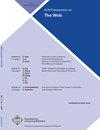Improving Conformance of Web Services: A Constraint-based Model-driven Approach
IF 4.1
4区 计算机科学
Q2 COMPUTER SCIENCE, INFORMATION SYSTEMS
引用次数: 0
Abstract
Web services have been widely used to develop complex distributed software systems in the context of Service Oriented Architecture (SOA). As a standard for describing Web services, the Web Service Description Language (WSDL) provides a universal mechanism to describe the service’s functionalities for the service consumers. However, the current WSDL only provides the description of the interfaces to a Web Service without any restrictions or assumptions on how to properly invoke the service, resulting in divergent understanding of the Web service’s behavior between the service developer and service consumer. A particular challenge is how to make explicit the various behavior assumptions and restrictions of a service (for the user), and make sure that the service implementation conforms to them (for the developer). In this article, we propose a constraint-based model-driven approach to improving the behavior conformance of Web services. In our approach, constraints are introduced in an extended WSDL, called CxWSDL, to formally and explicitly express the implicit restrictions and assumptions on the behavior of a Web service, and then the predefined constraints are used to derive test cases in a model-driven manner to test the service implementation’s conformance to its behavior constraints from the user’s perspective. An empirical study involving four real-life Web services was conducted to evaluate the effectiveness of our approach, and four actual inconsistencies were discovered.提高Web服务的一致性:一种基于约束的模型驱动方法
在面向服务体系结构(SOA)的背景下,Web服务已被广泛用于开发复杂的分布式软件系统。作为描述Web服务的标准,Web服务描述语言(WSDL)为服务消费者提供了一种通用机制来描述服务的功能。然而,当前的WSDL只提供了对Web服务接口的描述,而没有对如何正确调用服务进行任何限制或假设,这导致服务开发人员和服务使用者对Web服务行为的理解存在分歧。一个特别的挑战是如何明确服务的各种行为假设和限制(对于用户),并确保服务实现符合这些假设和限制。在本文中,我们提出了一种基于约束的模型驱动方法来提高Web服务的行为一致性。在我们的方法中,在一个名为CxWSDL的扩展WSDL中引入了约束,以正式和明确地表达对Web服务行为的隐含限制和假设,然后使用预定义的约束以模型驱动的方式派生测试用例,从用户的角度测试服务实现对其行为约束的一致性。为了评估我们的方法的有效性,我们进行了一项涉及四个真实Web服务的实证研究,发现了四个实际的不一致之处。
本文章由计算机程序翻译,如有差异,请以英文原文为准。
求助全文
约1分钟内获得全文
求助全文
来源期刊

ACM Transactions on the Web
工程技术-计算机:软件工程
CiteScore
4.90
自引率
0.00%
发文量
26
审稿时长
7.5 months
期刊介绍:
Transactions on the Web (TWEB) is a journal publishing refereed articles reporting the results of research on Web content, applications, use, and related enabling technologies. Topics in the scope of TWEB include but are not limited to the following: Browsers and Web Interfaces; Electronic Commerce; Electronic Publishing; Hypertext and Hypermedia; Semantic Web; Web Engineering; Web Services; and Service-Oriented Computing XML.
In addition, papers addressing the intersection of the following broader technologies with the Web are also in scope: Accessibility; Business Services Education; Knowledge Management and Representation; Mobility and pervasive computing; Performance and scalability; Recommender systems; Searching, Indexing, Classification, Retrieval and Querying, Data Mining and Analysis; Security and Privacy; and User Interfaces.
Papers discussing specific Web technologies, applications, content generation and management and use are within scope. Also, papers describing novel applications of the web as well as papers on the underlying technologies are welcome.
 求助内容:
求助内容: 应助结果提醒方式:
应助结果提醒方式:


